|

songs | interviews | photos | tours | boots | press releases | timeline
Next (US)
local New York City magazine
September 7, 2001
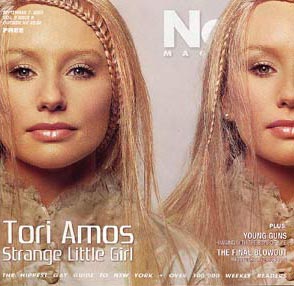
Cover Girl
An Interview With Tori Amos
by Gregg Shapiro
Photo by Thomas Schenk
Tori Amos has made a name for herself writing and performing her own songs. Unforgettable Amos originals such as "Silent All These Years" and "Crucify" (from Little Earthquakes), "God" and "Past The Mission" (from Under The Pink), "Professional Widow" and "Hey Jupiter" (from Boys For Pele), "Raspberry Swirl" and "Jackie's Strength" (from From The Choirgirl Hotel) and "Bliss" (from To Venus And Back) have become part of our contemporary musical landscape and vocabulary. Amos has also become famous for her activism, being a vocal supporter of RAINN (Rape Abuse and Incest National Network), an organization she helped found.
Doing cover songs is nothing new for you as many of your singles featured your versions of songs by Nirvana ("Smells Like Teen Spirit"), Joni Mitchell ("A Case Of You"), The Rolling Stones ("Angie") and Led Zeppelin ("Thank You"), to name a few. Can you say something about covering other people's songs?
It might have started when I was little [performing with] my dad. To make pocket money-I would do weddings and funerals. I was ten-years-old or something. I liked the funerals better than the weddings because I didn't have to play, "We've Only Just Begun." I started cutting my teeth there and then I was playing in gay bars when I was 13. You get a very different exposure to music at 13, playing for other people to sing along with in a piano bar, having to follow people and their style and to crawl into the songs. You learn how other people hear songs which brings us to this record. It was not just what men say and how a woman hears them-that really intrigued me-but even more so, it was what men heard other men say. That was a part of the whole record-about men together. I've called [the men on this record] a laboratory of men and I excavated them.
It definitely works. The first single here is The Stranglers' "Strange Little Girl." There seems to be a Stranglers revival occurring: Their song "Peaches" is on the Sexy Beast soundtrack and "Golden Brown" is on the Snatch soundtrack. Why did you choose to cover a song by them?
I started to really see the influence that [The Stranglers] had on a lot of people. These were two British men, not jock-y kind of guys, not football hooligans. They're not really like that, and yet they thought that they were sexy songwriters. You know, "Girls on the beaches/Looking at the peaches," the whole thing. And I think they are, in a way. [laughs] I was just drawn to them because... What a catalog they've written.
Your rendition of Neil Young's "Heart Of Gold" sounds more like Neil Young & Crazy Horse than the acoustic guitar- and harmonica-playing Young in his own version. Why did you choose that arrangement for that song.
When I stripped it back, I saw that there was a sort of fury in the song, the "heart of gold" that any of us are looking for as we're rampaging the Earth of all of her resources-for bullion and all sorts of things. You have to pull back from that, and I found this song to be this desperate cry for something. These two banshees came to visit me-as if they were crying for the Earth and loading their water pistols, or like they've decided, "Okay, you haven't heard us, you haven't heard the cry of the Valkyrie, and it's war." And they became these economic espionage characters who chose to go to these establishments that didn't hear those Sirens' cry and say, "We're going to cut you off where it's really going to be quite painful for you, because you can't hear anything else. If you think you're going to destroy our mother, it's not going to happen."
Speaking of the "Sirens' cry," how do you think Yoko Ono would react to your version of "Happiness Is A Warm Gun"?
We hope that she'll understand the spirit of it. I believe that she will. [Lennon was] a man who had seen an ad that said, "Happiness is a warm gun" and he asked in interviews, "Why is it warm? Because it's just been fired."-without knowing, when he said this, that one would be fired on him. Now, cut to the shooting incident [at a high school] in San Diego [in March]. I knew that "Happiness..." was on the record. It's been circling me for a few years now, because yes, we have a gun culture. And, yes, we have a Second Amendment. As you and I know, when it's easier to get a gun than a driver's license, something is just intrinsically wrong. When the school shooting happened again, I heard comments like, "Look, there are bad seeds out there and it's going to happen." It just seemed like this absolving, this kind of washing of hands, like "Hey it's not us," meaning those on the gun side. And I have friends who are part of the whole gun movement. But you have to go, "Why do we have to be so resistant to the fact that we have blood all over our hands-that kids are killing each other?" When do people turn around and say, "Whatever we're doing is not working..."?? On this record, the whole Second Amendment is talked about by my father on the single mainly because I figure if we're going to have the Bushes, Sr. and Jr., then I needed to have the Amoses, Sr. and Jr. I thought that was fair.
That's your father speaking about the Second Amendment on the CD?
That's the Reverend Doctor Edison Amos. [laughs]
Is that the first time that he's appeared on any of your CDs?
Yes. And he threatened me that I couldn't edit him to prove my point. I said, "I don't need to edit you to prove my point." [laughs]
His point is made just by him speaking.
Yes.
While were on the subject of violence, the strings on your cover of Eminem's :"'97 Bonnie & Clyde" give it this heart-pounding scary-movie quality. How did you approach that song?
When she spoke to me-the woman dying in the back of the car [in the song]-she took me by the hand and said, "You need to hear how I heard it." I brought in Phil Shenale, who has done string arrangements on most of my records, and I told him that I was going to speak this word-for-word how she heard it at the same moment that you hear his version. They happen at the same time in song's world. Once we started turning over the stones of Bonnie and Clyde, we followed the bloodline to Serge Gainsbourg's "Bonnie & Clyde." And that took us to, "this is a scary place to be and when you're the one with the 'ketchup' on your throat, it's a little different." This is how we heard it.
You have a large female and male queer following, two segments of the population that have taken a verbal beating at the hands of Eminem. What would you say to them about Eminem?
First of all, I don't think there's any kind of transmutation when you attack [someone] directly; I don't see the strength in that. But, I think that as an activist, as we both know, you go to the poison to get the antidote and there's power in that and there's healing in that. When you take a man's words, you take his seed. So, it depends on what kind of alchemy you want to do. I choose to do the kind that hopefully shakes things up and brings some awareness and brought the woman a voice. To me, what I found in my research, with anybody that heard this song is that nobody asked about her. Nobody wanted to know about her. Whether people hated his character or aligned with his character, nobody brought her up. I just kind of stood back there and I said, "There's something intrinsically wrong here." Even people who can't stand what his character is-and some, of course, found him charming-neither [of these groups] heard her. I said, "Okay, she needs to be humanized, because she could be our sister."
You gave her a voice.
She could be you or me. I've been in a car against my will. And I've felt like the way to becoming the phoenix out of the ashes was to reclaim that piece of you that people hijack.
That's very powerful. There are these amazing images of you, photographed by Thomas Schenk, as 13 different women, all of whom are connected to the songs. Can you please explain that concept?
Each of these songs became a myth of our time and, whatever you think of these songs or these writers (and even with my own work), certain songs transcend us. Yeah, I have pictures in my head when I hear my songs "Winter" and "Professional Widow," but they are not going to be the same pictures that you see. My personal experience with a song is just my personal experience. And a song goes beyond that. So, in this land of myth that you walk into in each song, it was a different male seed/vision, that I was taking to put into my garden. What I didn't realize, when I took their seed, is that I would also have to take a little egg back with me. [laughs] That's the trade-off that happens in mythology. That's how the land of myth works. It's a sort of strange and mysterious world. These women [characters] were hitting me from all sides. They would just come in and take over.
Was being each of these different women a bit like being a drag queen?
Oh, wow, I never thought of it like that, but it's a very good thought, isn't it? Especially when I did "Real Men."
[laughs]
I'm glad you mentioned that, because Joe Jackson's "Real Men" is the perfect song to close the album, because it sums up almost everything in the songs. Would you agree?
That's how I felt. At one point, it was starting the record, but then it was like, "No, that's not how the record should start. There's nothing that can follow it." It became the heart of the record, really. "Don't call me a faggot/Not unless you are a friend," is the obvious one for your readers. That song has always been such a mantra for tolerance. What really struck me was the line, "You can wear the uniform/And I can play along." I kind of cocked my head on that one. I giggle. And, "If there's war between the sexes/there'll be no people left..."
That's one of Joe Jackson's best lines. And, it's a very fitting finale to the record. Did you have contact with any of the songwriters while you were recording the album?
To be honest with you, to take on a project like this, you can't. You have to choose, like are you having a relationship with the daughters or the mothers? I had to stay true to my relationship with the daughters. My own songs are my song-girls. I'm their mother. Some of them, I don't know where they are in the world now. Sometimes, you just go, "Where is 'Leather' tonight? I have no idea what havoc she's creating." I know she's meeting people and she's making friends, and I'm not going to know them all.
This a great opportunity to ask you-now that you've done an album entirely comprised of cover tunes-how do you feel about people covering your songs?
It's the greatest compliment that you can have as a songwriter-even if somebody holds your feet to the fire or if they take a different position in the song or expose your hand on it. Somebody might cover one of my songs that shows a side where you might look at my character and see that my character isn't likable in this one and theirs is. I welcome anyone who could find something in my work. It means that you're a part of something that's bigger than you. It's truly an honor to have somebody think enough of your work to make it their own, as well. Yeah, even if they don't think a lot of you. With some of these artists (songwriters on Strange Little Girls), I might not have a whole lot to say to some of them. Some of them feel like they need to have power over another person, or they think women or gays need to be subjugated. Whoever they are, people are entitled to their beliefs, but it doesn't mean that you have to have a lot to exchange with each other. I did pick powerful wordsmiths. I did set out to prove that words are like guns. I set out to prove that words can wound and words can heal. I had heard a few men out there say, "What's everybody going on about? They're only words." As a songwriter-you have to stand by your work. So, I went to the men's words themselves, to prove to them how powerful their words are.
You have succeeded. I understand that you are going to be embarking on a tour in support of the Strange Little Girls album. But now, you have an additional family member. How do you see balancing motherhood and touring?
Well, right now she's jet-lagging and she won't eat her dinner. And I'm a crap cook. So we'll have Duncan (our chef) on the road with us. But, what a way to wake up during the day, to turn around if you get a spare second... There's just nothing more magical than somebody going [in baby talk] "Goo."
original article
 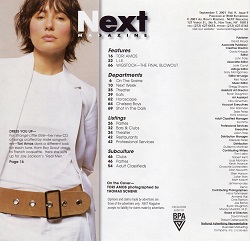
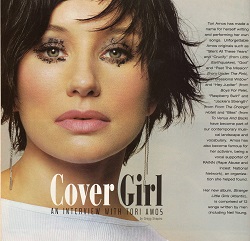 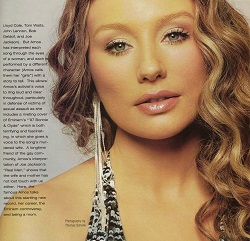
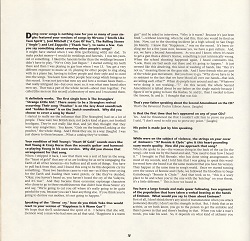 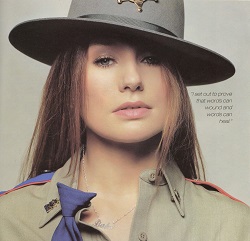
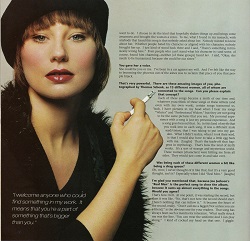 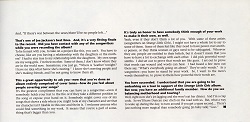
[scans by Sakre Heinze]
t o r i p h o r i a
tori amos digital archive
yessaid.com
|